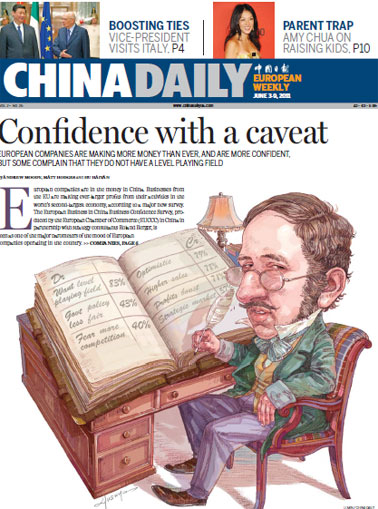Society
E. coli outbreak blamed on German veggie sprouts
Updated: 2011-06-06 07:25
(Agencies)
HAMBURG, Germany - The terrifying E. coli outbreak in Europe appears to have been caused by vegetable sprouts grown on an organic farm in Germany, an agriculture official Sunday as the toll climbed to at least 22 dead and more than 2,200 sickened.
| ||||
"There were more and more indications in the last few hours that put the focus on this farm," Lindemann said.
Many restaurants involved in what is now the deadliest known E. coli outbreak in modern history had received deliveries of the sprouts, which are often used in salads, Lindemann spokesman Gert Hahne told The Associated Press.
Definitive test results should be available Monday, Lindemann said.
In recent days, as health officials tried to pinpoint the source of the unusually lethal outbreak, suspicion fell on lettuce, cucumbers and tomatoes, perhaps from Spain. Spanish farmers complained that the accusations were having a devastating financial effect.
"First it's the 'evil' Spaniards, and then you hear, very surprised, that it is our neighbor," said Dietrich Benni, who lives near the German farm. "It's a bit scary all of this, especially that it is coming from an organic place."
He added: "No more organic food for me for now."
The farm was shut down Sunday and all its produce recalled, including fresh herbs, fruits, flowers and potatoes. Two of its employees were also infected with E. coli, Lindemann said. He said 18 different sprout mixtures from the farm were under suspicion, including sprouts of mung beans, broccoli, peas, chickpeas, garlic lentils and radishes.
As for how the sprouts became contaminated, Lindemann noted that they are grown with steam in barrels at 38 degrees Celsius (100 degrees Fahrenheit) _ an ideal environment for bacteria to multiply.
He said it is possible that the water was contaminated with E. coli or that the sprout seeds _ purchased in Germany and other countries _ contained the germ. He said the farmers had not used any manure, which is commonly spread on organic farms and has been known to cause E. coli outbreaks.
Lindemann urged Germans not to eat sprouts until further notice. He said authorities could not yet rule out other possible sources and warned Germans to continue avoiding tomatoes, cucumbers and lettuce for now.
AP journalists went to the farm on Sunday night, but nobody was available to talk. Telephone messages left at the farm's office were also not immediately returned.
The outbreak has been blamed on a highly aggressive, "super-toxic" strain of E. coli, perhaps one that scientists have never seen before.
E. coli can be found in the feces of humans and livestock and can spread to produce through sloppy bathroom habits among farmworkers and through animal waste in fields and in irrigation water. Organic farms tend to use more manure than other producers do.
Sprouts have been implicated in previous E. coli outbreaks, particularly one in 1996 in Japan, where tainted radish sprouts killed 12 people and reportedly sickened more than 12,000 others.
The head of Germany's national disease control center raised the death toll to 22 Sunday _ 21 in Germany and one in Sweden _ and said an additional 2,153 people in Germany have been sickened. That figure included 627 people who have developed a rare, serious complication of the disease that can cause kidney failure. Ten other European nations and the U.S. have reported a total of 90 other victims.
Earlier Sunday, Germany's health minister fiercely defended his country's handling of the crisis as he toured a hospital in Hamburg, the epicenter of the emergency.
The comments by Health Minister Daniel Bahr reflected a sharp shift in his public response to the crisis and came after AP journalists reported on emergency room chaos and unsanitary conditions at the same hospital, the University Medical Center in Hamburg-Eppendorf.
On Saturday, Bahr admitted that hospitals in northern Germany were overwhelmed and struggling to provide beds and medical care for victims of the outbreak, and he suggested that other German regions start taking in sick patients from the north.
But after one E. coli survivor told the AP that conditions at the Hamburg hospital were horrendous when she arrived with cramps and bloody diarrhea, Bahr announced a visit and told reporters that German medical workers and northern state governments were doing "everything necessary" to help victims.
Nicoletta Pabst, 41, told the AP that sanitary conditions at the Hamburg-Eppendorf hospital were shocking and its emergency room was overflowing with ailing people when she arrived May 25.
"All of us had diarrhea and there was only one bathroom each for men and women _ it was a complete mess," she said Saturday. "If I hadn't been sick with E. coli by then, I probably would have picked it up over there."
Doctors and nurses in northern Germany have been working overtime for weeks since the crisis began May 2.
E-paper

Harbin-ger of change
Old industrial center looks to innovation to move up the value chain
Chemical attraction
The reel Mao
Improving app-iness
Specials

Vice-President visits Italy
The visit is expected to lend new impetus to Sino-Italian relations.

Birthday a new 'starting point'
China's national English language newspaper aims for a top-notch international all-media group.

Sky is the limit
Chinese tycoon conjures up green dreams in Europe with solar panels



